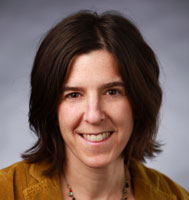Alison Miller, DO, a clinical assistant professor in the University of Wisconsin Department of Family Medicine and Community Health (DFMCH), went into medicine wanting to help others.

Alison Miller, DO
But, after more than a decade of practice, and an accompanying sense of being tied to the computer and overly focused on volume and quality metrics, she started to feel overwhelmed, isolated, frustrated and to some extent burned out. Sometimes she felt her job was more about responding to the needs of health insurance companies rather than her patients.
Dr. Miller’s experience isn’t unique. A 2015 study published in Mayo Clinic Proceedings showed that burnout among U.S. physicians worsened from 2011 through 2014, with 54.4 percent of all physicians—and 63 percent of family physicians—reporting at least one symptom of burnout.
‘The Most Profound Therapeutic Intervention’
Health care organizations across the nation are beginning to adopt system-level interventions to mitigate physician burnout. At the same time, individual doctors like Dr. Miller are taking steps to reconnect to their purpose, which can also help improve their professional satisfaction and well-being.
For Dr. Miller, that began with a wellness approach: promoting self-care at the UW Health Yahara Clinic where she works, and improving her own health through diet and exercise.
She also wanted to focus on the reason she became a doctor in the first place. She wanted once again to help others. “I thought about what brings me joy at work and how I could get back the fulfillment I once had,” she recalls. “I remembered what I liked best about being a family doctor.”
Dr. Miller began seeing patients with addiction in her clinic. Recognizing that addiction is a chronic disease—and that as a family physician committed to whole-person care, she had the potential to help patients overcome addiction—gave greater meaning to her work.
She began seeking day-to-day clinical advice on managing patients with addiction from DFMCH Associate Professor Aleksandra Zgierska, MD, PhD, a family physician and an addiction medicine expert who practices at her clinic.
With Dr. Zgierska’s encouragement and mentoring, Dr. Miller went on to complete training to obtain a waiver to prescribe buprenorphine for patients with opioid addiction. Now, she’s certified by the American Society of Addiction Medicine to teach waiver training herself. Her enthusiasm for medicine was revitalized.
“Being a primary care physician with the waiver has allowed me to help patients with substance use disorders return to a functioning lifestyle,” she reflects. “I have seen patients feel normal again after years of struggle and searching for the care they need. This has been the most profound therapeutic intervention I have given in my career.”
Professional Connections and a Community Approach
Dr. Miller is also grateful to Randall Brown, MD, PhD, DFASAM, a DFMCH associate professor, and Michael Miller, MD, an addiction psychiatrist and member of the University Hospital addiction medicine consulting service, for sharing their expertise with her.
She’s also deepened her knowledge and forged valuable professional connections through the University of Wisconsin Addiction Consultation Provider Hotline, the Addiction & Co-morbid Conditions: Enhancing Prevention & Therapeutics (ACCEPT) videoconference series and the Wisconsin Society of Addiction Medicine-hosted monthly drop-in telephone town hall series, which is open to all clinicians.
“The outpouring of support from colleagues with years of experience managing addiction has allowed me to share in a new community approach to treating patients,” she says.
Today, she looks forward to participating in emerging efforts at UW Health to implement a hub-and-spoke model for addiction treatment. This team-based approach integrates “hubs,” or specialized addiction treatment programs, and support for “spokes,” which comprise smaller or primary care practices.
Dr. Miller acknowledges that she now works harder than ever before seeing all of her patients, finishing notes and reviewing her files. But focusing on this population—in partnership with like-minded physicians— has renewed her energy and motivation, while strengthening her relationship with her family medicine patients.
“Treating patients with addiction has increased my job fulfilment and made me a better doctor and person,” she affirms. “It has guided me out of feeling overwhelmed with work to feeling invigorated about a new pathway to helping others.”
Published: June 2019
